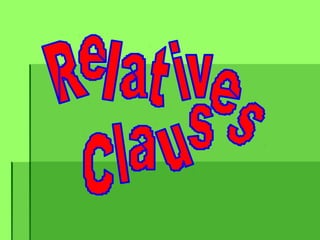
Relative
- 2. D.O. We are waiting for Apu. Same thing in different sentences. Apu is from India. Subj .
- 3. We are waiting for Apu, who is from India. Apu is from India. Subj
- 4. The two sentences can be linked into one. We use a relative pronoun to substitute the common item and join the two sentences in one. We are waiting for Apu , who is fromIndia. This is the main clause. This is the subordinate clause. We are waiting for Apu, who is from India. Main /independent clause Subordinate/Depen dent clause If we remove the subordinate clause from the sentence, its meaning is still complete. Its meaning is incomplete if we remove the main clause.
- 5. LINKING WORDS RELATIVE PRONOUNS WHO / THAT WHICH / THAT WHOSE PREPOSITION + WHOM or +WHICH (Formal)
- 6. LINKING WORDS RELATIVE ADVERBS WHEN / THAT WHERE WHY / THAT
- 7. Two types of relative clauses: Non-Defining Extra information about a noun in a sentence The new Woody Allen film, which I saw last week, is very good. Use commas Always use a relative pronoun: who/whom ,which whose, where, when Defining Essential information about a noun in a sentence You’re the man (that) I saw last week. No commas Can omit pronoun if it is not the SUBJECT of the relative clause That (informal) can replace which / who/ when / why but not where, whose or whom
- 8. Defining relative clauses = No commas A defining relative clause identifies which person or thing we mean exactly. It cannot be left out of the sentence or the meaning of the sentence is incomplete : It’s the book that I read yesterday. * It’s the book. (this sentence is incomplete)
- 9. Defining relative clauses = No commas You can omit the pronoun if it is the OBJECT of the relative clause (if there is a SUBJECT and a VERB after the relative pronoun ) It’s the book that I read yesterday (omit) It’s the book I read yesterday. The girl who lives next door is French. We can never omit WHOSE and WHERE
- 10. Non-defining relative clauses = with commas This kind of clause gives additional information about a person or thing. The sentence still makes sense without the non-defining relative clause: My neighbour, who studies engineering, is very noisy. My neighbour is very noisy.
- 11. Formal / Informal Non-Defining relative clauses (with commas) are more common in written English because they are quite formal. In spoken English we would probably use two sentences. Compare: Elvis Presley, who has sold over one billion albums, died of prescription drug abuse. [written] with Elvis has sold over a billion albums. He died of an overdose. [spoken]
- 12. Verb + preposition When the verb is followed by a preposition in the relative clause we can use two structures: The woman is a lawyer. I spoke to a woman Formal: Preposition + rel.pronoun The woman to whom* I spoke is a lawyer. (*We can’t omit the relative pronoun after a preposition) Or Informal: Preposition after the verb The woman (who) I spoke to is a lawyer.
- 13. Relative Adverbs Time: when or in/on/at + which or that That was the year when/that/in which I got my degree. 11 September 2001 was the day when/that/on which people’s attitude towards terrorism changed. The adverb (when) can be omitted. 11 September 2001 was the day people’s attitude towards terrorism changed.
- 14. Relative Adverbs Place: where or in/on/at + which or that That’s the factory where/in which they make chemicals. That’s the spot where/on which the battle took place. The adverb (where) cannot generally be omitted.
- 15. Relative Adverbs: Reason: why (for which) I will explain the reasons why /for which the accident occurred The adverb (why) can be omitted. I will explain the reasons the accident occurred
- 16. Relative pronouns Possessive: whose It takes the place of his, her, their or a noun in possessive case ‘s. Andy Warhol was a pop artist whose paintings are famous worldwide.(His paintings are famous…) Charlie, whose sister lives in London, is travelling to England this summer. (Charlie’s sister lives in London).
